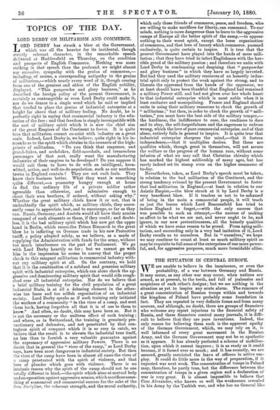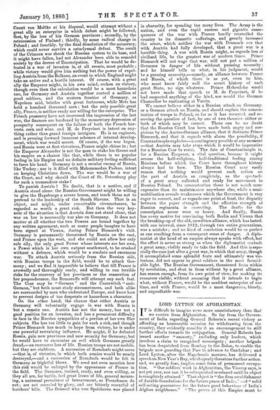THE SITUATION IN CENTRAL EUROPE.
WE are unable to believe in the imminence, or even the probability, of a war between Germany and Russia. It may occur, as any other war may occur, when nations are armed, as at present, to the teeth, and full of jealousies and' suspicious of each other's designs ; but we see nothing in the situation as yet to inspire any acute alarm. The rumours of a great concentration of Russian troops within and towards the kingdom of Poland have probably some foundation in fact. They are repeated in very definite forms and from many- sources, and although, no doubt, there are groups of financiers who welcome any report injurious to the financial safety of Russia, and these financiers control many journals, it is diffi- cult to believe that they are pure inventions. Indeed, the only reason for believing them such is the apparent apathy of the German Government, which, we may rely on it, is well informed of every great movement in the Russian, Army, and the German Government may not be so apathetie as it appears. It has already perfected a scheme of mobilisa- tion, upon which it cannot improve ; it is as ready as it could become, if it fussed ever so much ; and it has recently, we are assured, greatly restricted the leave of .officers in active em- ploy. It could do little more in the way of preparation, if it expected war next week. The concentration of troops in Poland may, therefore, be partly trim, but the difference between the concentration of troops in a given region and a declaration of war is very great. It is almost impossible to believe that Czar Alexander, who knows so well the weaknesses revealed in his Army by the Turkish war, and who has no General like Count von Moltke at hut* disposal, would attempt without a great ally an enterprise in which defeat might be followed, first, by the loss of his German provinces ; secondly, by the retrocession of Finland ; thirdly, by some radical change in Poland ; and fourthly, by the final dissolution of the autocracy, which could never survive a cataclysmal defeat. The result of the Crimean war shook the Russian system to its base, and it might have fallen, had not Alexander been able to remodel society by the decree of Emancipation. That he would be de-, feated in a war of invasion is, at all events, most probable ; while victory would give him nothing but the power of expel- ling Austria from the Balkans, an event in which England might take an active and a hostile interest. Of course, with a great ally the Emperor might, in his own mind, reckon on victory, though even then the calculation would be a most hazardous one, for Germany and Austria together control a million of good soldiers, and the western frontier of Germany, as Napoleon said, bristles with great fortresses, while Metz has held a hundred thousand men ; but the only possible great ally, France, is neither ready nor willing for the enterprise. The French peasantry have not recovered the impression of the last war, the finances are burdened by the momentary depression of prosperity consequent on the failure of both the French har- vests, corn and wine, and M. de Freycinet is intent on any- thing rather than grand foreign intrigues. He is an engineer, and is pressing forward immense schemes of internal develop- ment, which war would wrest. Of course, if the war began, and Russia were at first victorious, France might chime in ; but the Emperor Alexander is not the ;nan to stake his throne and his empire on a chance like that, while there is no popular feeling in his Empire and no definite military feeling sufficient to force his hand. Germany is not a secular enemy of Russia, like Turkey ; nor is it filled with Mahommedan Pashas, intent on keeping Christians down. The war would be a war of the Court, and why should the Court of St. Petersburg play for such a tremendous stake ?
To punish Austria ? No doubt, that is a motive, and if Austria stood alone, the Russian Government might be willing to give the Hapsburgs a severe lesson, and teach them not to pretend to the leadership of the South Slavone. That is an object, and might, under conceivable circumstances, be regarded as worth a great risk. But then the very key- note of the situation is that Austria does not stand alone, that war on her is necessarily war also on Germany. It does not matter at all whether the two Powers are bound together by any written agreement, such as many people imagine to have been signed at Vienna, during Prince Bismarck's visit. Germany is permanently threatened by Russia on the east, and France upon the west, and she could not allow her only safe ally, the only great Power whose interests are her own, a Power which is her own outpost southward, to be crushed without a defence, which would be a resolute and enormous war. To attack Austria seriously from the Russian side, with Russian troops in the field, would be to attack Ger- many; and we find it impossible to believe that till France is avowedly and thoroughly ready, and willing to run terrible risks for the recovery of her provinces or the reassertion of her preponderance, the Romanoffs will attempt any such feat. The Czar may be " German " and the Czarewitch "anti- German," but both must study circumstances, and both alike are surrounded by men who understand Europe, and know how to prevent designs of too desperate or hazardous a character.
On the other hand, the chance that either Austria or Germany will voluntarily engage in war with Russia is but a remote one. Austria has not the money, has not a good position for an invasion, and has a permanent difficulty to face in the Russian sympathies of a portion of her own Slav subjects. She has too little to gain for such a risk, and though Prince Bismarck has much to hope from victory, he is under one powerful restraining influence. He might, if he defeated Russia, gain new provinces and new security for Germany, but he would have to encounter an evil which Germans greatly dread,—an enormous loss of life. Russian troops are not mobile, but they are stubborn. A succession of Zorndorfs might occur —that is, of victories, in which both armies would be nearly destroyed,—and a succession of Zorndorfs would be felt in Germany as frightful blows. We need not even mention how this risk would be enlarged by the appearance of France in the field. The Germans, trained, ready, and even willing, as they all are, for battle, feel great losses of life, general mourn- ing, a universal prevalence of bereavement, as Frenchmen do not ; are not consoled by glory, and are bitterly resentful of butchers' bills. The General who won Speicheren was placed in obscurity, for spending too many lives. The Army is the nation, and even the rapid success and gigantic conse- quences of the war with France hardly reconciled the country to its domestic sufferings, and greatly increased the sense, which neither the war with Denmark nor that with Austria had fully developed, that a great war is a horrible thing. A war with Russia might, as regards loss of civilised life, be the greatest war of modern times. Prince Bismarck will not wage that war, will not put a million of Germans in danger of life without pressing necessity : and he himself tells us what, in his judgment, would be a pressing necessity,—namely, an alliance between France and Russia, of which there is as yet, even to him, who must know fairly well the secret history of each great State, no sign whatever. Prince Hohenlohe would not have made that speech to M. de Freycinet, if he had suspected anything of the kind, nor would the German Chancellor be rusticating at Varzin.
We cannot believ e either in a Russian attack on Germany. or a German attack on Russia, and should explain the concen- tration of troops in Poland, so far as it has occurred, and re- serving the question of fact, by one of two theories, either or both of which may be correct. There can be no doubt that the Russian Court has been made both angry and sus- picious by the Austro-German alliance, that it distrusts Prince Bismarck, and that it regards with alarm the possibility, if Constantinople explodes—a contingency possible at any moment —that Austria may take steps which it would be imperative for a Russian Czar to resist. The fate of Constantinople is, for a Russian Emperor, a vital question, because it might arouse the half-religious, half-traditional feeling among Russians before which the Czars have throughout history always had to bow. The Russian Court may easily reason that nothing would prevent such action on the part of Austria so completely, as the spectacle of a great army collected and ready for movement in Russian Poland. Its concentration there is not much more expensive than its maintenance anywhere else, while a semi- mobilisation reveals weaknesses which the Government is very eager to correct, and as regards one point at least, the disparity between the paper strength and the effective strength of Russian regiments, is correcting. The drafts for the conscription never were so heavy. And finally, Russia has every motive for convincing both Berlin and Vienna that the breaking-up of the old, unwritten alliance, which has lasted. with one interval, since 1812, through two entire generations, was a mistake ; and no kind of conviction would be so perfect as one resulting from a consequent sense of danger. A diplo- matist at the head of an empire always speaks with effect, but the effect is never so strong as when the diplomatist controls a great army, visibly ready to take the field. And this is espe- cially the case just after a great war, in which that army, though it accomplished some splendid feats and ultimately was vic- torious, did not appear to great soldiers in the most formid- able light. The Russian Government, threatened from within by revolution, and shut in from without by a great alliance, has reason enough, from its own point of view, for making its resources visible, without assuming that it intends to begin what, without France, would be the maddest enterprise of our time, and with France, would be a most dangerous, bloody, and unprofitable war.



































 Previous page
Previous page